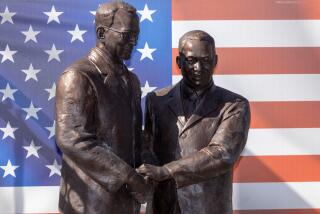Rosa Parks Helps Mark 1955 Bus Boycott
MONTGOMERY, Ala. — Rosa Parks came home Friday to mark the 40th anniversary of her historic refusal to give up her bus seat to a white man.
“When we made the breakthrough in Montgomery with the buses, that was just the beginning of our stride toward freedom,” Coretta Scott King said.
King and Parks, joined by a new generation of familiar civil rights names--Martin Luther King III, Ralph Abernathy III and Jesse Jackson Jr.--kicked off five days of events commemorating the 381-day Montgomery bus boycott that helped bring down segregation laws across the South.
The boycott in Alabama’s capital demonstrated the strength of black unity as a young preacher, Dr. Martin Luther King Jr., galvanized crowds in churches with his call for a nonviolent social revolution. Coretta Scott King is his widow.
The boycott led to a Supreme Court order against segregation of public transportation, opening the door for blacks to gain equal access to all public accommodations.
Anniversary events included a ceremony at the Montgomery Street site where Parks was arrested Dec. 1, 1955. A historic marker now stands on the spot.
Parks was jailed for refusing to give up her seat to a white man and move to the back as new white riders boarded the bus.
“I’m just overwhelmed by this wonderful reception,” said Parks, 82, who now lives in Detroit. “I’m looking forward to an educational and inspirational weekend.”
Parks visited a race relations seminar at Maxwell Air Force Base, then attended a book-signing and program at Carver High School.
Coretta Scott King called for a new kind of movement: not a boycott, but a turnout of voters to elect candidates who will serve the interests of minorities. She also said blacks need to create companies to strengthen minorities economically.
More to Read
Sign up for Essential California
The most important California stories and recommendations in your inbox every morning.
You may occasionally receive promotional content from the Los Angeles Times.










